- Home
- Chuck Palahniuk
HOPE AND GORY
HOPE AND GORY Read online
HOPE AND GORY
(from Gear Magazine)
No glamour. No groupies. No money. At the Olympic wrestling trials, it's blood,
sweat and pain. Especially pain. By Chuck Palahniuk
It takes a couple of hours before you notice what's wrong with everyone. It's their ears. It's as if you've landed on some planet where almost everybody's ears are mangled and crushed, melted and shrunken. It's not the first thing you notice
about people, but after you notice it, it's the only thing you see.
"To most wrestlers, cauliflower ear is like a tattoo," says Justin Petersen. "It's like a status symbol. It's kind of looked on with pride in the community. It means you've put in the time."
"That's just from getting in there and brawling, getting in there and getting your
ears rubbed a lot," says William R. Groves. "What happens is as you rub and rub and rub, the abrasion, the cartilage separates from the skin, and in that separation, blood and fluid fills it up. After a while, it drains out, but the calcium will solidify on the cartilage. A lot of wrestlers see it as a kind of badge of wrestling."
Sean Harrington says, "It's like a stalactite or something. Slowly blood trickles in there and hardens. It gets injured again, and a little more blood trickles in and hardens, and it's unrecognizable anymore. Some guys definitely feel that way, that it's a badge of honor."
Petersen says, "I had one teammate who, before he'd go to bed, he'd sit there and
punch his ears for 10 minutes. He wanted cauliflower ear so bad."
"I've drained mine a lot," says Joe Calavitta. "I got syringes, and when they blew
up, I kept draining them. They fill up with blood. As long as you keep draining them before the blood hardens, you can keep it down, pretty much. You can get it done by a doctor, but you'd have to go in all the time, so you get your own syringes."
Petersen, Harrington, Groves and Calavitta. They're amateur wrestlers.
What happens on this page isn't wrestling, it's writing. At best, this is a postcard from a hot, dry weekend in Waterloo, Iowa. Where meat comes from. From the North Regional Olympic Trials, the first step where for $20 any man can compete for a chance on the U.S. Olympic wrestling team. The Nationals are over, so are the other regional. This is the last chance to qualify for the finals.
These men, some are here to wrestle other high school "Junior" level wrestlers now that the regular season is over. But for some others, ranging in age from 17 to 41, this will be their last shot at the Olympics. As one USA Wrestling official says, "You're going to see the end of a lot of careers here."
Everybody here will tell you about amateur wrestling. It's the ultimate sport, they'll tell you. The oldest sport. The purest sport. The toughest sport. It's a sport under attack from men and woman alike. It's a dying sport. It's a cult. It's a club. It's a drug. It's a fraternity. It's a family. For all of these people, amateur wrestling is a misunderstood sport.
"You don't have the cheerleaders running around, confetti falling from the ceiling
and Jack Nicholson in the bleachers," says former college and Army team wrestler Butch Wingett. "You might have a bunch of grizzled old guys who might be farmers or were maybe laid off from the John Deere plant."
Wrestlers are just misjudged a lot," says Lee Pritts, who wrestles freestyle at 54
kilograms. "It's actually a classy sport. And a lot of times it's kinda considered barbaric. It gets a lot of bad publicity."
"People don't give the sport its respect because they think it's just two guys rolling around," says three-time NCAA wrestler Tyrone Davis, who competes in Greco-Roman at 130 kilograms. "It's more than just two guys rolling around. Basically, wrestling's like life. You got a lot of decisions out there. The mat is your life."
When you fly into Waterloo, Iowa, the city looks exactly like the map on its
website: flat and cut with freeways. At the Young Arena, near the dry, empty downtown, all day before weigh-ins, wrestlers stop in to ask if there's a sauna in town. Where's the scale? The Young Arena is where elderly people go on weekdays to walk around and around the air-conditioned indoor track.
Wrestlers will lose up to a pound a minute during a seven-minute match. Stories
they tell include running in-flight laps back and forth in jetliners despite the crew's protests. Then doing chin-ups in the jetliner's galley area. An old trick for high school wrestlers is to ask to go to the bathroom during classes and then doing chin-ups on the toilet stall walls, letting the sharp edge along the top cut calluses into their hands. In 1998, Wingett says, three college wrestlers died of dehydration trying to cut weight while taking the supplement creatine.
"You get it down to a system," says Justin Petersen, who at 17 has had his nose
broken about 15 times. "You think, 'I can have this carton of milk, I can have this bagel, and I will have sweated it off by this time of the day, at which time I can have this sip of water and still make weight.' You have it down exact."
Lee Pritts and Mark Strickland, a 76 kilogram freestyle wrestler with "Strick"
tattooed on his arm, bring their own stationary bikes to town and are sweating off the weight in room 232 of the Heartland Inn. A third friend, Nick Feldman, is here for moral support and to massage them when their bodies get so dehydrated that their muscles cramp.
Feldman, a former college wrestler who drove down from Mitchell, South Dakota, says, "Wrestling's like a club where once you get in, you can't get out." "When I was in college I cried a lot just because it was so hard, and I was never very good," says Ken Bigley, 24, who started wrestling in first grade and now coaches at Ohio State University. "I asked myself a lot of times why I did it. It's like a drug. You get addicted. If I didn't need it, I wouldn't be here. You don't make money. You don't get any glory. It's just searching for the high."
Sean Harrington says, "I've been wrestling so long that I don't remember what
pain was like before wrestling."
Says Lee Pritts, 26, a coach at the University of Missouri, "It's kind of weird. You get in the shower after a tournament and your face is usually banged up from wrestling all day and the water running over it gives you a little burn, but if you take a week off you miss it. You miss the pain. After a week off, you're ready to go back because you miss the pain.
The pain is maybe one reason why the stands are almost empty.
At home, in a jar full of alcohol, junior-level wrestler Mike Engelmann from
Spencer, Iowa, keeps a translucent sliver of cartilage that surgeons removed from the meniscus of his knee. It's his good luck charm. He's been stitched up nine times. About his nose, Ken Bigley says, "Sometimes it's pointing left. Sometimes it's pointing right."
A medic in an orange "Sports Injury Center" T-shirt says, "Ringworm is unbelievably common among these guys." One of the oldest rules, he says, is that
wrestlers have to get down and wipe up their own blood with a spray bottle of bleach. "His grandparents will say all the time, 'This is nuts'," says software engineer David Rodrigues, here with his 17-year-old son, Chris, a four-time Georgia State champion who placed fifth in the world in the Youth Games in Moscow last year. "There's been the injuries," he says, listing them off, "hyper-extended knee, hyper-extended elbow, a slight tear in a back muscle, a broken hand, broken finger, broken toe, sprained knee. But we've seen worse. We've seen kids carried out on stretchers. Broken collarbones, broken arm, broken leg, broken neck. God forbid, we had a kid in Georgia whose neck was broken. Those are the kind of injuries you pray will never happen, but by the same token, we all understand that's the nature of the sport."
"And my broken tooth," his son, Chris, says. David Rodrigues explains, "His tooth broke off and it was in the kid's head, sticking out of the kid'
s head."
About Chris' mother, David Rodrigues says, "My wife will only go to a couple
tournaments a year, she'll go to State, and she'll go to Nationals, but she won't go to a lot, because she's afraid of injuries. She doesn't want to be there when one happens."
Chris' front teeth are bonded now.
In a few more days, Chris will break his jaw in the Junior world team trials.
Timothy O'Rourke, who's wrestling today for the first time in 19 years, is here
without his wife. "She doesn't want to see me get hurt," he says.
For Greco-Roman wrestler Phil Lanzetella, it was his wife who first noticed his injury and saved his life.
I was going to Sweden/Norway, and my wife was putting her head to my chest, hugging me," he says. "I'd just gotten back from the Olympic training center. And she's about five-three, and she said, 'Your heart sounds like it's making a funny sound.' She said, "You'd better get checked out." So I went to the emergency room."
It was a torn heart valve.
Lanzetella says, "to make a long story short, I went in on Sunday night and they
told me on Tuesday of that next week that I'd need immediate open heart surgery. The only thing they could surmise is that it was from wrestling. One of the top surgeons in the world, the one who did my surgery, said he'd never seen an injury like it in his career. If you tear a valve like that, the analogy is hitting the steering wheel of a car, head-on, at 60 miles an hour."
The heart valve was torn in three places- in a V-shape with another tear
horizontally across the mid-point of the V- forcing Lanzetella's hear to pump five times faster than normal to keep up.
This was in February of 1997. Phil Lanzetella had qualified for the Olympic trials
every year since 1980, when he was on top, still a teenager, but already a world-class wrestler, dating Walter Mondale's daughter and headed for the Olympics in Moscow. The Olympics we boycotted that year. Phil's options at the time were a mechanical valve, a pig heart valve or a recovered human valve. The recovered valve was the choice that would let him still compete.
"I didn't tell my wife. I came home one day and said, 'Hey, Mel, what do you
think about me wrestling?' and she said, 'Yeah, okay, if you want to be single.' But she got used to the idea."
They've been married 15 years.
Finally, Melody Lanzetella said, "If you're going to do this, then you're going to
win."
So far, Phil hasn't. He didn't make it in the South Regionals. "I took 10th in the Nationals, top eight qualifying, in Las Vegas." "In Tulsa", he says, "my hotel van broke down, and I missed weigh-ins. I got stuck on the highway. So this is really it. This is it, literally."
So for Phil Lanzetella, 37, this is his last shot at the Olympics after decades of
training and competition.
It's the last shot for Sheldon Kim, 29, from Orange County, California, who works
full time as an inventory analyst, and is here with his wife Sasha and their three-year-old Michaela, and who is busy trying to drop two extra pounds in the last half hour before weigh-ins are over.
It's the last shot for Trevor Lewis, 33, who has a baby boy due in two weeks and
practices two or three times every day as part of the Army's world class athlete program. It's the last shot for Michael Jones, 38, of Southfield, Michigan, whose first film project, Revelations: The Movie, is in production.
Jones says, "My body just can't go through another four years of wrestling guys
like this. Like I say, my knees are starting to buckle. My back is starting to really get to me now. I don't want to get to around 50 years old and be bent over with a cane." It's the last shot for former college wrestler Timothy O'Rourke, 41, who last wrestled in 1980 and says, "I saw something on the internet and thought, 'What the hell, I'll give it a shot.'"
Despite everything at stake, the mood is less like a fighting event than a family
reunion.
"It's just focusing the energy for the match," says Ken Bigley. "When we're on the
mat, we want to just beat the piss out of each other, but when we're off the mat we know what one another's going through because we've been there. As much as you're enemies on the mat, as hard as you're going to hit him, once you're off the mat we're not violent people- we just like a violent sport."
Nick Feldman calls it "elegant violence."
During the matches, wrestlers lay around on the edges of the mats and watch.
Wearing baggy sweats. They stay together, arms around each other, or locked in practice holds, in the kind of laid-back closeness you see only in men's fashion advertising anymore. Abercrombie & Fitch or Hilfiger magazine ads. There seems to be nobody demanding "personal space." No "attitude."
Like brothers, they even look alike. Many with broken noses. Cauliflower ears.
Most have a kind of pulpy, boiled look from sweating hard and landing on their faces. They're all muscled like an anatomy chart. Most seem to have heavy brows.
"In our wrestling room, we usually have the heat high," says Mike Engelmann,
whose long eyelashes are in contrast to his brow. "What that does is it kind of flushes your body. You sweat all of it out. You drink more and sweat it out again, and it kind of sinks the cheeks and the eyes in, a little bit, and the forehead's all you've got left sticking out there. I kind of like the look, because it shows you're working hard."
On Saturday, despite all the years of preparation, the freestyle tournament is all
over, fast.
Joe Calavitta loses and is out of the Olympics.
In Junior competition, Justin Petersen wins, and as soon as he's off the mat he
throws up.
The few people in the stands cheer, Sheldon Kim's wife, Sasha, saying softly over
and over, "Go Shel. Go Shel. Go Shel."
"When you're in there, one-on-one with somebody," says Timothy O'Rourke, "you
can't even hear what's going on in the stands."
O'Rourke is pinned in five seconds.
Sheldon Kim loses.
Trevor Lewis wins his first match, but loses his second.
Chris Rodrigues wins his first match.
Sheldon Kim's younger brother, Sean, loses to Rodrigues.
Mark Strickland goes against Sean Harrington, with Lee Pritts coaching from a
corner. Losing, Strickland calls a time-out, screaming at Pritts, "I'm going to break his ribs!" His face twisted as if he's already crying.
"The toughest guys I know cry after matches because they put so much into it,"
Joe Calavitta says.
Pritts says, "You become so close with a work-out partner that they're like your
own blood, and if they go out and lose a match, lose a big match, then you've just had your heart torn out."
Strickland loses to Harrington.
"I hate to see him lose," Pritts says. "I've seen him have so much success, that
when he loses, it's crushing."
Pritts wins his match.
Chris Rodrigues wins his second match.
Ken Bigley wins his first and second matches, but loses his third.
Rodrigues loses his third match and is out of the freestyle tournament.
Sean Harrington and Lee Pritts are going to the Olympic finals in Dallas.
A medic refuses to say home many muscles are pulled, bones broken, joints dislocated. "All that's," he says, "is highly confidential."
And the freestyle tournament is over for another four years.
The next morning, Sunday, a Marine recruiting Humvee is parked outside the Young Arena, blaring heavy metal rock music from giant speakers as two recruiters in fatigues stand nearby.
Inside the arena, the mats are laid on top of each other, double-thick, in
preparation for the Greco-Roman tournament.
"A lot of people are scared of Greco," says Michael Jones. "It took me a lot of
years to g
et into it because I was scared. Because of the throws. You've got some serious throws."
Phil Lanzetella suits up to wrestle, the scar from his open heart surgery running
down the center of his chest. He explains how the third and final heart valve tear
probably happened while he was practicing Greco-Roman wrestling with Jeff Green at
the Olympic Training Center in 1997.
"I weighed about 270 and Green's probably about 260 so we totaled about 530,
coming through the air at I don't know how many miles an hour. Twisting and turning. And we got next to some smaller guys. That space was tight. And they put their hands and feet up," he says. "We came out of the turn, through the air, and I landed on the guy's foot."
Lanzetella says, "I felt it. I knew what had happened, but I didn't think much of it. I'd taken worse shots than that."
Today, there's some talk about the darker side of wrestling, how someone snuck a
camera into the weigh-ins at the Midlands tournament a few years ago and the best
wrestlers in the world ended up naked on the internet. People talk about how amateur wrestlers have been stalked by obsessed fans. Called late at night. Harassed. Killed. "I know there was a lot of talk," says Butch Wingett. "DuPont was hot for Dave Schultz for a long time."
Former college wrestler Joe Valente says, "This sport gets so much disrespect.
People think it's a bunch of homo men trying to feel each other up." As the Greco-Roman competition starts, there's no one in the stands. Keith Wilson wins his first match, loses his second, but will still go to the Olympic finals because he qualified in the Nationals.
Chris Rodrigues wins and will go to the Olympic finals as a Greco-Roman wrestler. The only high school student to qualify.
With his father after the match, he says, "This is just great. I'm still in high
school. I get to go back home and tell all my friends I'm going to the Olympic trials in Dallas."
Phil Lanzetella wins his first match 3-0.
His second match, Phil ties 0-0 in the first period, loses a point to his opponent in the second period and loses in overtime.
Already the crowd of wrestlers is thin. People are getting out, catching planes.

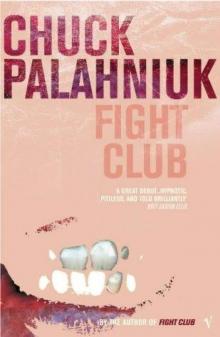 Fight Club
Fight Club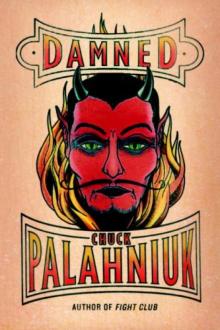 Damned
Damned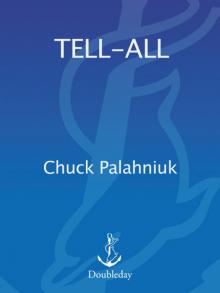 Tell-All
Tell-All Choke
Choke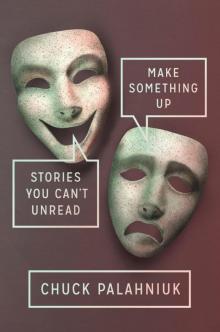 Make Something Up: Stories You Can't Unread
Make Something Up: Stories You Can't Unread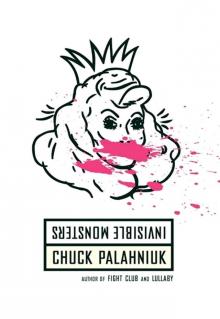 Invisible Monsters
Invisible Monsters Phoenix
Phoenix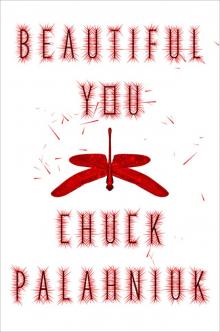 Beautiful You: A Novel
Beautiful You: A Novel Haunted
Haunted Survivor
Survivor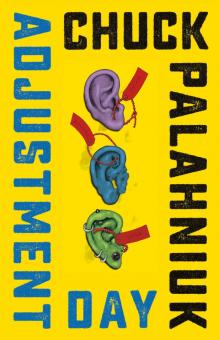 Adjustment Day
Adjustment Day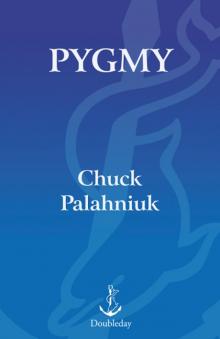 Pygmy
Pygmy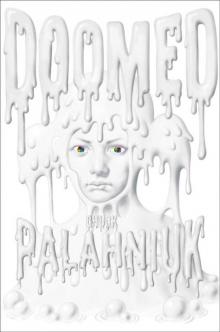 Doomed
Doomed Lullaby
Lullaby Snuff
Snuff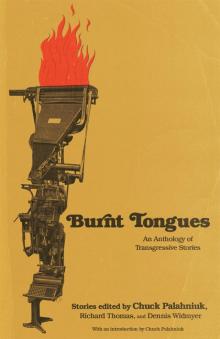 Burnt Tongues
Burnt Tongues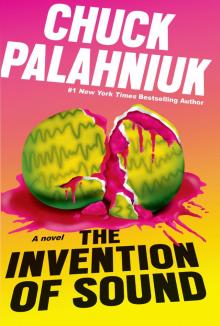 The Invention of Sound
The Invention of Sound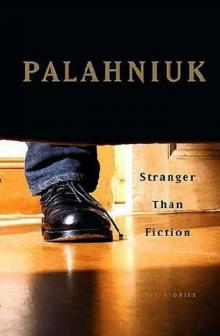 Stranger Than Fiction (True Stories)
Stranger Than Fiction (True Stories)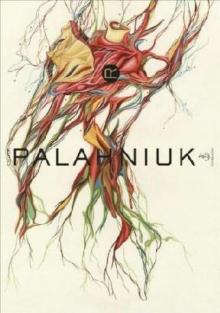 Rant: The Oral History of Buster Casey
Rant: The Oral History of Buster Casey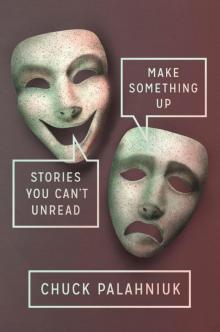 Make Something Up
Make Something Up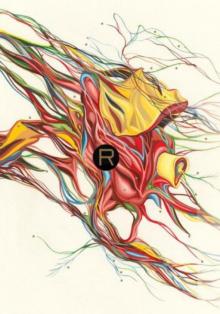 Rant: An Oral Biography of Buster Casey
Rant: An Oral Biography of Buster Casey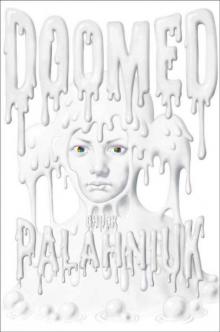 Doomed d-2
Doomed d-2 HOPE AND GORY
HOPE AND GORY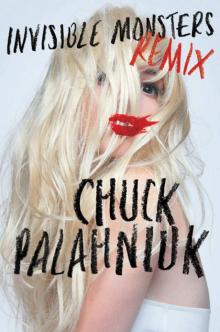 Invisible Monsters Remix
Invisible Monsters Remix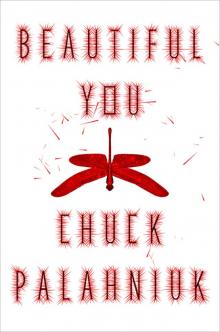 Beautiful You
Beautiful You Fugatives & Refugees
Fugatives & Refugees